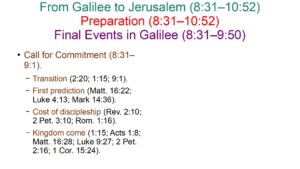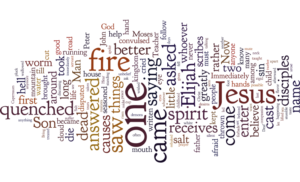Jesus from Galilee to Jerusalem
Mark 8:31–10:52
Preparation
First Prediction of Death and Resurrection (8:31).
The Kingdom is Near (1:15; 9:1)
Final Events in Galilee (8:31–9:50).
Call for Commitment (8:31–9:1).
Transition.
First prediction.
Telling the disciples about His imminent decease would prepare them for what they would ultimately suffer for His name.
What would come next would also prepare the disciples—it would also prepare those who were reading this gospel account, the Roman Christians in particular.
He also addresses the people nearby, likely in Caesarea Philippi, including His disciples. They all needed to know this part.
There is the pattern of denial of oneself paralleled with losing one’s life.
What does it mean to deny yourself and take up your cross, following Jesus? It means turning away from the sinful things and situations you like and enjoy, or turning away from the sinful influences in your life.
It also includes turning away from things you might indulge in that may not be sinful, like food.
Jesus is alluding to what He was going to face on the cross, something on which He would be sacrificed and killed. Death and martyrdom are fates we must be willing to face (Rev. 2:10). And if we can face that, surely we can face sharing the gospel with our co-worker or neighbor.
What are some ways in which you personally can deny yourself and take up your cross? I want everyone to think about that question, and if you feel comfortable sharing an answer, please do!
Then we see an interesting paradox (8:35). How can you save your life if you’ve lost it?
Is this paradox only talking about martyrdom? Since martyrdom is unlikely in our society, is there a way we can apply this without having to give our life? What are some ways in which we can do this?
This is similar to denying oneself, carrying your cross, and following Christ.
The life that we gain is eternal life in heaven, no matter what we deny here on earth, even our very lives.
This shows the priority we must place on Christ and the gospel—He should have the highest priority in our lives. So everything we do needs to be for His sake and the gospel’s.
Then we have the question: What is your soul worth? Well, it should be your most prized possession, something worth protecting and caring for at all costs.
Why is a soul so valuable? Because it is eternal, while everything else on this earth is temporal (temporary).
When you look at the Kelley Blue Book, and you find two cars of different makes but the same class, mileage, and year, do you expect them all to be the same value? More dependable makes and models are more valuable than others. But what if your car never broke down and would never break down, how much would it be worth?
So nothing on this earth is worth your immortal soul. What are you willing to deny so your soul can live eternally in heaven with our Lord? The whole world will one day be worthless because it will all be burned up (2 Pet. 3:10). And even before then, you will die, and lose your soul… and all the world with it. So in the end, if you’ve lost your soul, you’ve lost everything.
Then we see more equivalencies Jesus makes—one way in which we can lose our own soul, to desire to save our own life is to be ashamed of Christ and His words (Christ and the gospel – 8:35; cf. 1:14-15). Paul declared that he was not ashamed of the gospel of Christ (Rom. 1:16).
Then we see the consequence of being ashamed of Christ—Christ being ashamed of us. This is a truly frightful thing, for Christ to tell you on that Last Day that He is ashamed of you.
That Last Day is described as Christ coming “in the glory of His Father with the holy angels.” This is a picture of the Final Judgment, the Second Coming, when the whole world is destroyed.
Such destruction shouldn’t matter to us if our treasures have been built up in heaven. If all our treasures our here, we’ve lost our own soul.
In this same context, Jesus tells the people that some would still be living when the kingdom comes with power.
We note that Jesus discusses the kingdom of God as coming soon, just as He did in the very beginning of His ministry (1:15).
There are four common interpretations of what Jesus is talking about here.
The one I hear most in churches of Christ is this is foreshadowing to Pentecost in Acts 2.
Since Jesus is addressing everyone there, we don’t know who all will die between this point and Acts 2. We do know at least one person won’t see it: Judas Iscariot.
That kingdom is seen as the church present with the power of the Holy Spirit given, as predicted more immediately in Acts 1:8.
The problem with this interpretation, some will say, is that it doesn’t seem to fit the context of the passage or Matthew’s or Luke’s parallels (Matt. 16:28; Luke 9:27).
Jesus was just talking about the Final Judgment and His Second Coming, which is also hinted at in Matthew and Luke.
But if this is talking about His Second Coming, well, they’re all dead now, so how can some not have tasted death?
Some suggest Jesus was wrong, or perhaps His Second Coming was deferred just as judgment on Nineveh was deferred after Jonah preached to them. But there’s no indication that this was deferred as there was in other cases.
Some will say this is talking specifically about John, who would see it when he was writing Revelation. If so, well, could “some” be the same as “one”? Unlikely.
Another interpretation that appears to ignore the Second Coming context is that it refers to the destruction of Jerusalem nearly 40 years later.
One of the most popular interpretations in conservative scholarly circles is that this is foreshadowing the coming Transfiguration.
Some, meaning three (Peter, James, and John), will be brought up onto that mountain to witness Christ is His glory, which itself is viewed as a preview of His power and the Second Coming.
It seems odd, however, to say that some won’t die in the next six days, and that the rest would never see it.
Proponents of this view, however, cite 2 Pet. 1:16, where Peter recounts His witnessing of the Transfiguration. The “coming” referenced there can’t be His first coming since they all could see Him, so it must be His Second Coming. He would later relate Jesus’ power and His Second Coming.
This, however, would make the kingdom that is coming with power something that will only belong to Jesus for a very short while and be quickly given to the Father (1 Cor. 15:24).
In defense of the common view found in churches of Christ (that it’s a reference to Pentecost), there is an odd division here that does not exist in Matthew’s or Luke’s accounts: “And He said to them.” While the two sayings are similar, these could be referring to two different, but nearby events.
Similarly, as Jesus had already been preaching the kingdom was at hand (1:15), it seems likely He would give a further time stamp on it—within this generation!
Wherever you land on this verse, know that within their generation the kingdom of God—His church—had come with the power of the Holy Spirit in Acts 2, whether this passage refers to it or not.

